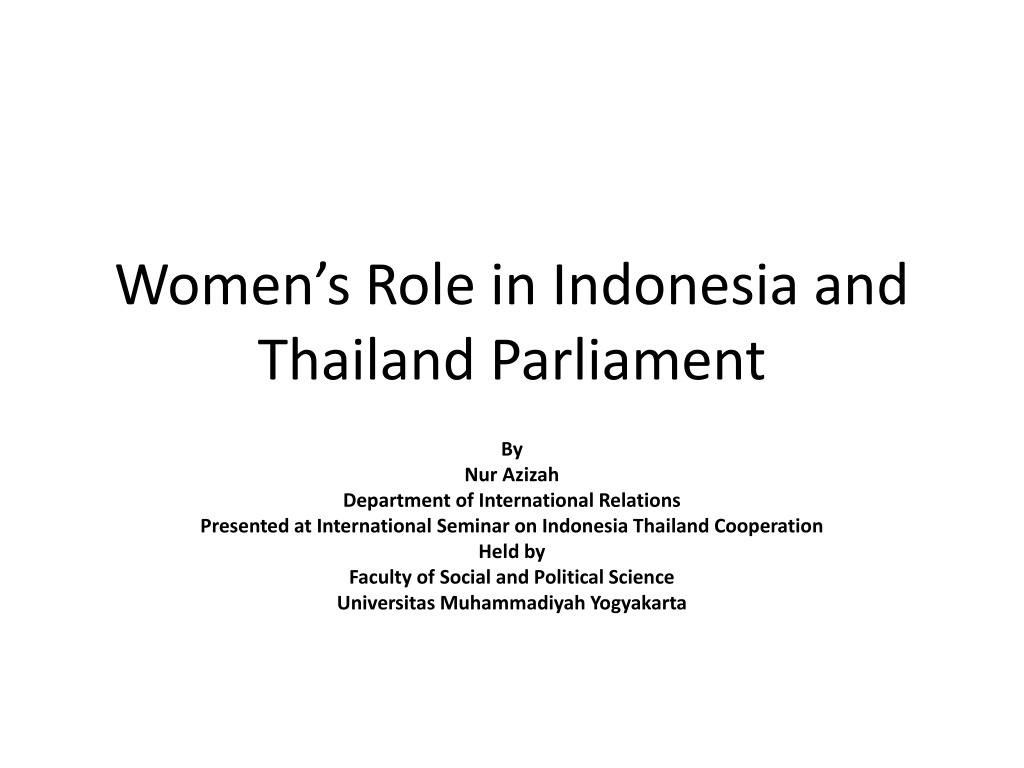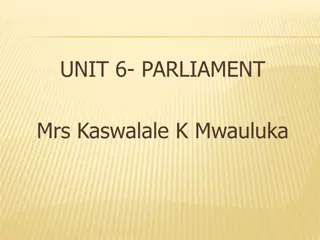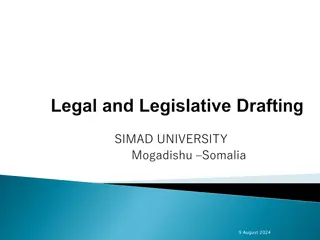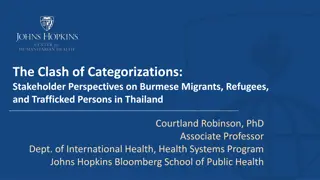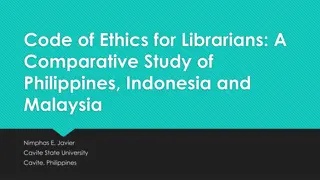Women's Role in Parliament: A Comparative Study of Indonesia and Thailand
The article analyzes the under-representation of women in the parliaments of Indonesia and Thailand, exploring the causes and impact of women's participation. It discusses the importance of women's perspectives in policymaking, with insights from Anne Phillips on the politics of presence. Additionally, it highlights constitutional provisions promoting gender equality and laws addressing violence against women in Indonesia.
Uploaded on Oct 03, 2024 | 0 Views
Download Presentation

Please find below an Image/Link to download the presentation.
The content on the website is provided AS IS for your information and personal use only. It may not be sold, licensed, or shared on other websites without obtaining consent from the author. Download presentation by click this link. If you encounter any issues during the download, it is possible that the publisher has removed the file from their server.
E N D
Presentation Transcript
Womens Role in Indonesia and Thailand Parliament By Nur Azizah Department of International Relations Presented at International Seminar on Indonesia Thailand Cooperation Held by Faculty of Social and Political Science Universitas Muhammadiyah Yogyakarta
WOMEN IN PARLIAMENT Thailand and Indonesia are lag behind Rwanda (63,8 % in 2013 election), Bolivia (53,1 % in 2014 election), Cuba (48,9 % in 2013 election), Sweden (43,6 % in 2014). This article aims to elucidate the causes of the under-representation of women in Indonesia (and Thailand) politics Does women s representation in parliament lead to women-friendly policies? Does women s representation have some specific priorities THAILAND INDONESIA Lower House : In the late 1960s, : 2.8 % 1980 s : 4 % 1992 : 6 % 2001 : 9.2 % 2014 : 4,8 % (12 of 250) Lower House : 17,3 % (97 from 560 - in 2014 election) 18 % ( in 2009 election) Upper House : 25 % (33 from 132)
Anne Phillips : The Politics of Presence, Oxford University Press, USA, 1995 Anne Phillips argues that the politics of ideas is an inadequate vehicle for dealing with political exclusion. The numerical presence of women will bring women s perspectives, values and issues that are poorly represented. Female legislators acting on the behalf of women, or representing women s interests The substantive perspective claims that increased representation of women in parliament would make a substantive difference because women and men have different experiences and different priorities in political issues. It is considered important to incorporate women s interests and perspectives that lead them to advocate issues that are either marginalized or excluded, especially in times when legislative bodies are dominated by men.
Constitution - Law Thailand The new constitution of 1997 : Article 30 states that women and men shall enjoy equal rights (provided a framework for gender rights). Indonesia The Constitution of the Republic of Indonesia, Undang-Undang Dasar 1945, Paragraph 1 of Article 27 stipulates that: every citizen enjoys equal status before the law and government, and is obliged to uphold this status without exception. An amendment to the Constitution was, as a consequence, issued in 2000 which recognizes that every person shall have the right to be free from discriminatory treatment based upon any ground whatsoever and shall have the right to protection from such discriminatory treatment."
Indonesia LAW OF THE REPUBLIC OF INDONESIA NUMBER 23 OF YEAR 2004 REGARDING ELIMINATION OF VIOLENCE IN HOUSEHOLD Article 4 : Elimination of violence in household shall be intended to: a. prevent all forms of violence in household b. protect the victim of violence in household c. take action against the perpetrator of violence in household d. maintain the intactness of harmonious and prosperous household.
Pro Womens Institutions - Policy The State Ministry for Women s Empowerment (1978) Gender Mainstreaming at the National and Subnational Levels Presidential Decree 9/2000 on Gender Mainstreaming within the framework of Law 22/1999 on Regional Government, the Minister of Home Affairs released Ministerial Circular Letter 050/1232/SJ of 26 June 2001 on the implementation of gender mainstreaming. The Indonesian National Commission on Violence against Women (Komnas Perempuan
Decentralization impact on Women Decentralization impact : Komnas Perempuan recorded that as at August 2011 there were 207 discriminatory policies in the name of religion and morality, 78 are targeting specifically on women. The majority of these policies (200 of 207 policies) exist at district and provincial levels.
Women Quota Policy in Indonesia In article 55 Law No 8 Year 2012 on legeslatif election : The list of prospective candidates as referred to in Article 53 contain at least 30% (thirty percent) representation women . Article 55 state that In the list of prospective candidates, every 3 (three) candidates, there are at least one (1) women candidate.
Women in Politics In 2003 Election Law 12/2003 was passed in which the lobby for a 30% quota for women in legeslative nomination. Article 65 of the Law on the Method for Nomination of DPR, DPD, Provincial DPRD, and Regency/City DPRD Candidate Members, point 1 reads: Each participating political party may nominate candidates for the DPR, DPRD, and Regency/City DPRD, for each electoral district, giving consideration with regard to the representation of women of at least 30%.
Framework Historical Contex Cultural Contex The Character of Political Party Women Quota in Politics The Number of Women in Politics
Indonesia has historical background which impact on the women involvement in politics. In Indonesia, colonial tragedy begun in 16 20 century had encouraged the women inclution in anti colonialist movement. Thenceforth, women began their involvement in public sector.
Early Feminist Movement THAILAND INDONESIA Kartini (1879-1904) fight for education for women, promotion of monogamy, and reevaluation of Javanese culture. 1928 The First Women Congres in Indonesia Education for women,
Affirmative Action Policy THAILAND No : ? INDONESIA Yes : In article 55 Law No 8 Year 2012 on legeslatif election : The list of prospective candidates as referred to in Article 53 contain at least 30% (thirty percent) representation women . Article 55 state that In the list of prospective candidates, every 3 (three) candidates, there are at least one (1) women candidate.
THE MASCULIN POLITICAL PARTY Political party dominated by men, and characterised by : late-night meetings and smoking corrupt dealings, aggression and boys-club networking Unwelcoming to women : women is perceived as as space invaders Keeping a worklife balance is especially hard for women with children, in part because it is still considered a norm that mothers play a day-to-day management role at home.
Women in Indonesian Parliament 1999, 2004, 2009 40 36 35 30 Golkar Demokrat 25 PDIP PKB 20 PAN PPP PKS 15 Hanura Gerindra 10 8 5 0 1999 2004 2009
Cultural : The impact of Religion Principals on Gender Relation JAPAN Confucian, Budhism defined how women should act and behave. the three people a woman must obey (he own father in her home before marriage, her husband after she is married, and her children after her husband s death). INDONESIA Islam More egalitarian: For God, the grade or the rank of human being is not depended on their gender but on their piety.
